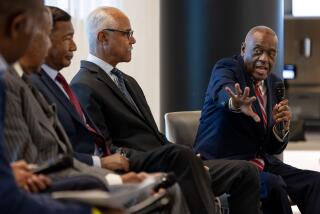COLUMN RIGHT / HARRY G. SUMMERS JR. : Roots of the Coup of 2012 Lie in 1992 : Moving from fighting to good works, as in Somalia, could have tragic consequences.
- Share via
“It’s great to be here doing the opposite of a soldier.” Those words, first uttered by a U.S. Navy officer during the 1991 Bangladesh relief operation, may become commonplace. The U.S. military is becoming increasingly involved in humanitarian relief and peacekeeping operations, currently in Bosnia and soon in Somalia. Given our traditional anti-military bent, many Americans would see that as a welcome trend. But it is a trend that could have tragic consequences.
It could destroy the military’s fighting spirit, the very essence of the military’s reason for being. This danger is not new. We did it after World War II. “(L)iberal society, in its heart, wants not only domination of the military, but acquiescence of the military toward the liberal view of life,” wrote T.R. Fehrenbach in his classic critique of the Korean War.
“Domination and control society should have,” he wrote 30 years ago in “This Kind of War.” “But acquiescence society may not have, if it wants an army worth a damn. By the very nature of its mission, the military must maintain a hard and illiberal view of life and the world. Society’s purpose is to live; the military’s is to stand ready, if need be, to die.”
But the critics do not understand the distinction. They now call for the military to move away from bloodshed and reorient itself toward good works.
The problem is that “the values composing civilization and the values required to protect it are normally at war,” Fehrenbach says. “When Greek culture became so sophisticated that its common men would no longer fight to the death . . . a horde of Roman farm boys overran them . . . the descendants of Macedonians, who had slaughtered Asians till they could no longer lift their arms, went pale and sick at the sight of the havoc wrought by the Roman gladius Hispanicus as it carved its way toward Hellas.”
When American “fighting men” gush that “It’s great to be here doing the opposite of a soldier,” it’s a sign that that time may be approaching here as well. Such a collapse of fighting spirit could be as fatal to the survival of American civilization as it was to Greek civilization.
There could be another even more serious consequence. Reorientation of the military toward peacetime operations could undermine civilian control of the military, the very foundation stone of American democracy.
A powerful warning of where current trends could lead is Air Force Lt. Col. Charles E. Dunlap Jr.’s award-winning National War College student essay, “The Origins of the American Military Coup of 2012,” excerpted in the winter 1992-93 issue of Parameters, the U.S. Army War College Quarterly. Written from the perspective of a senior military officer about to be executed for opposing the coup, Dunlap posits the takeover of the U.S. government by a “military plenipotentiary” in 2012. This takeover “was the outgrowth of trends visible as far back as 1992,” including “the massive diversion of military forces to civilian uses.”
Among the examples he cites is the “Military Cooperation with Civilian Law Enforcement Agencies Act of 1981,” which was “specifically intended to force reluctant military commanders to actively collaborate in police work.” This was a historic change of policy, Dunlap says. “Since the passage of the Posse Comitatus Act in 1878, the military had distanced itself from law enforcement activities . . . . By 1992 ‘combatting’ drug trafficking was formally declared a ‘high national security mission.’ ”
In 1986, Congress “declared overseas humanitarian and civic assistance activities to be ‘valid military missions’ and specifically authorized them by law.” Former Secretary of State James A. Baker III typified the trendy new tone in early 1992, saying that in airlifting relief supplies, “We will wage a new peace.”
“In truth,” Dunlap says, “militaries ought to ‘prepare for war’ and leave the ‘peace waging’ to those agencies of the government whose mission is just that. Nevertheless, such pronouncements (as Baker’s)--seconded by military leaders--became the fashionable philosophy. People in the military no longer considered themselves warriors. Instead, they perceived themselves as policemen, relief workers, educators, builders, health care providers, politicians--everything but war-fighters.”
“When the military was . . . obligated to engage in a bewildering array of non-traditional duties to further justify its existence,” Dunlap concludes, “it is little wonder that its traditional apolitical professionalism eventually eroded.” Hence the coup. We ignore his cautionary tale at our peril.
More to Read
Sign up for Essential California
The most important California stories and recommendations in your inbox every morning.
You may occasionally receive promotional content from the Los Angeles Times.













